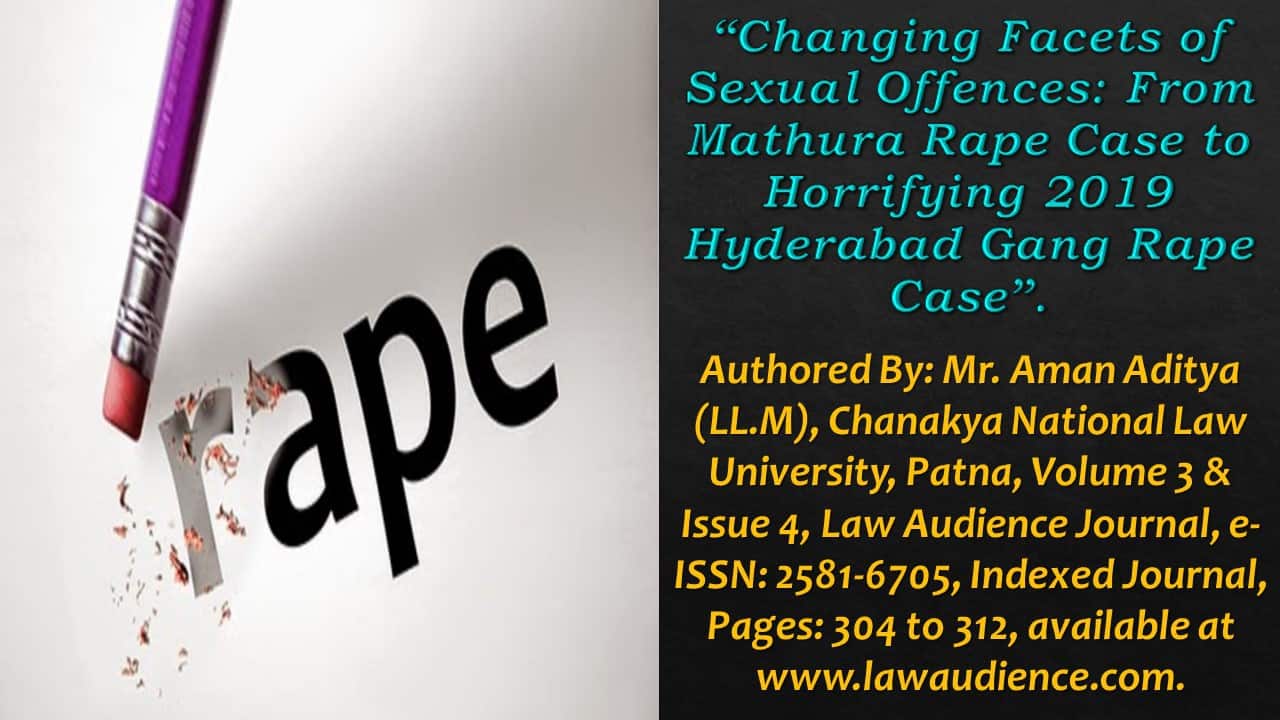Click here to download the full paper (PDF)
Authored By: Mr. Aman Aditya (LL.M), Chanakya National Law University, Patna,
Click here for Copyright Policy.
I. INTRODUCTION:
“Sexual offending is often considered as somehow inherently different from other forms of offending. Sexual offenders occupy a special place in contemporary society’s secular demonology. Sexual crime is a mainstay of the tabloid and broadsheet newspapers, where offenders become ‘monsters’, ‘beasts’ and ‘sex friends.’ Concern about sexual crimes has become a panic. Since the present chapter deals with sexual offences against women, an attempt has been made to find out whether the present law is gender neutral or not. As consent is the biggest factor in the determination of the fact whether a particular sexual activity is an offence or not. Consequently, changes can take place in the sexual orientation of the human beings and the law may not recognize that change. Men are supposed to have that great power which gives them ability to control their natural forces, but if men failed to do so can result in uncivilized behaviors. Yes, I am talking about the one of the most common and horrible crimes that is sexual offences against women. India is one of the most dangerous countries in sexual offences against women. According to a new study, in every 25 minutes a rape has taken place.
The Commonwealth Human Rights said that in India 2,72,844 rape cases had been registered across the country between 2001 to 2013. Among all these cases, Nirbhaya Rape Case brings resolution in the laws on sexual offences. Nirbhaya Rape case touches the inner soul of every citizen of the country which makes them to come on road for demanding justice. On the night of 16th December, a very gruesome and brutal act had taken place on Nirbhaya who was 23-year-old victim by six monsters like men. Among all those convicts, four were given capital punishment and one was juvenile who released after three years and the sixth person was Ram Singh who committed suicide in the trail period the court. Now let us see what makes the society comes on road and how it changed the law on the sexual offences. Nirbhaya was a name given to the rape victim of the 16th December 2012 Delhi gang rape incident. On the chilly December night Nirbhaya and his friend were returning from a movie theatre and were waiting for the bus at the Munirka bus stand and they boarded a bus there. The bus was empty with tinted windows. They were assaulted by six males, including a minor of 17 year of age. When his friend tries to protect Nirbhaya, he was beaten up by the perpetrators. Nirbhaya was not just sexually violated but her body was also badly mutilated beyond human imagination. Her private parts were mutilated taking intestines out. Later on, while taking her to Singapore for treatment she died by multiple organ failure and cardiac arrest and internal bleeding on 29th December. The police identify all the six victims namely Akshay Thakur, Pawan Gupta, Vinay Sharma, Mukesh Singh, Ram Singh and the juvenile. This Nirbhaya Rape Case shocked the society and makes them protest against the government demanding justice to Nirbhaya which further results in the Capital Punishment to the four perpetrators”.
II. CLASSIFICATION OF SEXUAL OFFENCES:
II.I SEXUAL HARASSMENT AT WORKPLACE:
You must feel secure or comfortable at the place of working or learning. If you feel insecure or uncomfortable you can report it to the authority of job, schools or any place of working. Supreme Court held that it is the duty of the employer or other institutions to provide a safe working environment to their employees as to live with dignity is guaranteed under our constitution and it is punishable under Indian Penal Code.
II.II DOWRY DEATH AND BRIDE BURN:
A survey was conducted on ‘Why women burn? ’ the survey brings the reason that the brutal behavior of men toward women on giving birth to female child. The survey also publishes the death of young female bride due to the demand of dowry by their husband and their families. To get a control on this situation certain amendments was made in Indian Penal Code- Section 304B[1] (“dowry death”) and Section 498A (“mental and physical cruelty to wives on account of dowry demands”).
II.III THE EVE TEASING MALAISE:
If a person is found guilty for making a female the target of indecent gestures, songs, remarks or reactions can be punished with three months of imprisoned. There are several sections in Indian Penal Code against Eve Teasing like section 354, 509, 292
II.IV RAPE:
It is the most terrible of the sexual offences even more hideous than the murder of the victim. Rape results in great devastation of the victim physically as well as emotionally. When the offence of rape occurs, the victim loses her basic human need right: Control of her physical and emotional of self. Rape is an offence punishable under section 375 and 376[2] of Indian Penal Code.
II.V STALKING:
It can be physically or electronic via phone call or messages, the victim can complain to the police and it is punishable with one to three years in jail.
II.VI SEXUAL ABUSE OF PERSON WITH DISABILITIES:
Sexual abuse comes with a great mental and physical trauma but it becomes much bigger if the person is disabled.
II.VII ELDER ABUSE:
Elder Abuse is the situation in which the girls are physically or emotionally abused by their elder family members, but due to fear or societal pressure more than 90% of such cases remain unreported. The act of Sexual Abuse gives a very vital effect not only on the victim but also affects her family as well as the society also. It creates a sense of fear in females and slows down their progress. For a minimum time of horrible pleasure, the whole life of the victim, her family and the perpetrators got spoiled. But the main problem is that, more than half of such offences remain unreported due to the fear of society. Touching a girl without her consent is a very brutal and not tolerate able crime. To get a control on these crimes our judicial system had done several amendments in the laws of such offences in the name of ‘Criminal Law Amendment Act 2013’ (Nirbhaya Act).
III. SEXUAL OFFENCES ARE COVERED BY THE PARLIAMENT UNDER THE FOLLOWING ACTS:
III.I INDIAN PENAL CODE, 1860:
Indian Penal Code is the official criminal code of India. It came into force during the early British period 1962 in British India, however till now there had been several amendments made which boost up the IPC by other criminal provisions. The India Penal Code is sub- divided into 23 chapters, comprises 511 sections.
III.II DOWRY PROHIBITION ACT, 1961:
The Dowry Prohibition Act, 1961 comprises several anti-dowry laws passed by several states. As per in sec 3 of Dowry Prohibition Act, 1961, if any person found giving, taking or abets giving or receiving dowry will be liable for a penalty. The punishment for the offence can be minimum five years of jail and fine of more than Rs.15000 or the amount of the dowry received, whichever is higher.
III.III INDECENT REPRESENTATION OF WOMEN (PROHIBITION) ACT, 1986:
Indecent Representation of Women (Prohibition) Act, 1986 is an act of parliament which was enacted with an intention to prohibit indecent representation of women through advertisement, publications, and paintings or in any other manner. This act says that, no person is allowed to publish in any manner such contents which contain indecent representation of women in any manner.
III.IV SUPPRESSION OF IMMORAL TRAFFIC IN WOMEN AND GIRLS ACT, 1956:
Under article 23 of convention, human trafficking is prohibited and contravention of prohibition is punishable. Suppression of Immoral Traffic in Women and Girls Act, 1956 was passed to have a check and control on such offences.
IV. SOME SUGGESTIONS TO DEAL WITH THE VICTIMS OF SEXUAL OFFENCES:
The victim first and foremost to be taken to any women’s or children hospital to ensure their health and safety. Taking them to the hospital as soon as possible is extremely important for several reasons:- The victim may need instance medical support. Several important tests can be done like pregnancy, AIDS and venereal disease. Recordings can be made for the purpose of further inquiry. Preferably, a female nurse should be appointed during sensitive time for the proper care of the victim, the female nurse should be undergone with such physical and emotional traumatic experience. There should always be a female officer at the time of investigation or interview by the police of the victim by which the victim will feel comfortable as the questions asked this time makes the victim portray the assault. Lie detector test of the accused person. Polygraph is a machine used to measure bodily functions, this machine measures the heart rate, blood pressure, breathing rate which are used to indicate the degree of truthfulness. However, this polygraph test is not admissible in the court but is done by the police officers because it helps them to get right kind of leads in their investigation.
The concept of plea-bargaining, it is a new concept in India. When it is difficult to prove all the elements of higher offences then the prosecution may plea bargain with the victim to admit his guilt in lower offences and can be punished with reduced sentences. It helps the victim not to portray the assault scenario again which can reduce the mental pressure of the victim. Public censure, in order to curb these vile urges which, give powers to men to violate the mind and body of the victim, the perpetrators should be publicly censured. The offender’s name, address, offence and punishment should be publicly exposed through media, newspapers, radio and sever other sources. This will create a sense of fear in the mind of the future offenders and resists them in involving in such type of shameful offences. Section 74 of Indian Penal Code (Amendment) Bill, 1978 deals with public censure.
V. CRIMINAL LAW AMENDMENT ACT 2013:
Also called Nirbhaya Act as this amendment was done in criminal law after the Nirbhaya case. It is an Indian legislation passes by the Lok Sabha on 19 March 2013 and later by the Rajya Sabha on 23rd March 2013. The Act was introduced with an intention to bring certain amendments in the Indian Penal Code, Indian Evidence Act and Code of Criminal Procedure 1973 on the laws of Sexual Offences. It was originally an ordinance implemented by the President of India, Pranab Mukherjee on 3rd February 2013.
VI. SEXUAL HARASSMENT:
According to Section 354(A) of Indian Penal Code, Sexual Harassment is the unwelcomed touching or other physical contact, making remarks like sexual comments, jokes, looks, behaviors, showing pornography including videos, books etc. or asking for sex or other physical activity. There is a special provision in Indian Penal Code for sexual harassment at work place – The Sexual Harassment of women at workplace (prevention, prohibition and redressal) Act and Rules 2013 . Indian Penal Code does not limit the sexual harassment at workplace only but it is punishable no matter where it is done. The Indian Penal Code gives the victim an option to seek civil remedies and damages, involving office administration. Sexual Harassment is punishable with one to three years of imprisonment.
VII. PEEPING TOMS PUNISHED:
As per in section 354 of Indian Penal Code[3], it is a crime to look or to take pictures of a women when she is undergoing her private acts and where she thinks no one is watching her. Such acts includes when a woman is using toilet, undressed or in undergarments and engaged in sexual activities. If a woman agrees to take her private photo, then it is not a crime but if woman wants to restrict the photo with only certain or a specific people and then sharing those pictures with others is a crime.
Example: A girl agrees to record her private moments with her boyfriend with a mindset that the recordings will remain with her boyfriend only, but the boyfriend share those recording with his friends. This could amount to the crime under provision on voyeurism. The punishment for peeping toms is one and three years in jail along with fine and if a person is found committing the same offence more than ones than it will amount to three and seven years in jail along with fine.
VIII. OUTRAGING MODESTY OF WOMEN:
The law does not define what outraging modesty actually means. The court usually determine by taking all the circumstances surrounding the offence into consideration. Section 354 of Indian Penal Code punishes a person if he assaults or use criminal forces with the intention to outraging the modesty of a woman. The punishment for the offence is one year but it may extend to five years with fine and is a non-bailable offence. For Example: A man pulls a woman’s clothes while playing Holi and rips her stole apart. It is a crime only if the man intended to do so and was aware with the fact that the act can outrage the modesty of the woman.
IX. STALKING:
As per in Section 354D of Indian Penal Code, Stalking is either online or in person continuously following a woman or contacting her where she has clearly shown she doesn’t want attention. The punishment for Stalking is three years for the first offence and five years for repeated offence. If a person has a duty to do so then the section makes an exception to it.
X. CHILD SEXUAL ABUSE:
Our attitude to sex and our law of sexual offences, is too far inadequate to do the battle against the incidence of multifarious kinds of sexual offences especially in the context of expanding horizons of human rights and the enlarging shade of fundamental rights. Present laws are too over-the-hill and too antiquated to be relevant in the context of the modern Indian culture and the existing sexual mores and customs. The sexual offences are committed not from the excess of lust but also from a desire to hurt. The problems of sexual assault are multi-dimensional and hydra headed on either sex as well as the third sex. This weed has not even aloof CHILDREN, the purest soul in the universe.
C- Common
H- Harassment
I- In the
L- Land of
D- Demons
This is the actual meaning of children in the minds of the demons present on this planet. An adult’s mind develops from the impressions he receives as a child during his childhood. The skills and experience he develops during his formative years shape the mindset of the adult. For instance, a person who has experienced a happy childhood memory will remain balanced in all stages of life. On the other hand, a person who had an obnoxious and resentful childhood will be a man at war with himself as well as the world outside. Over emphasis should be on parents to provide their children with shell of safety, credence, and serenity while their upbringing. It leads to re-victimization. There is a need to bring Multidisciplinary teams’ concept in the country for the purpose of reporting and conduct of cases. The concept of Ombudsman who is the guardian of children-rights and act as a watch dog and serves as a voice of children. This concept is nowhere introduced in our country when it comes to children rights.
Last but not least, the involvement and contribution of Media in the favor of victims and their families should be encouraged in order to make their voice reach to the farthest corner of the globe. All this journey of pain and suffering a child victim goes through, brings the child to that point at which he/she is unable to find words to voice her expression. The Supreme Court and the legislators have provided various laws and provisions for the fight against Child sexual abuse. But still the reality is at par with what is limited in books. All the efforts will go in vain if we didn’t come together as a whole to protect our innocent future generation.
That day is not too far when we as parents will consider hundred times while taking decision to bring a life on this earth. Hence it is appropriate to say that government is quite concerned about the growing number of child sexual abuse but their actions and concern are not walking together on the same path. This weed will extirpate sooner or later. It’s like a cactus. If we cut one bud another one will sprout out if it and that has already taken place i.e., Male Sexual Abuse is spreading widely and bringing a hell of a turn in society.
XI. CONCLUSION:
The criminal law is one of the most vital links which defines the relationship between a state and its citizens. Sexual assault affects many individuals in profound ways, and has demonstrated that the effects of sexual assault spread out into the community in a ripple effect among those close to the victim/survivor, those who work with her or him, and the communities and wider societies within which the violence of sexual assault exists.
A number of implications flow from this. In relation to family members and friends, if we acknowledge that many family members and friends will also be profoundly harmed by the sexual assault of a significant other, then specialist services will need to be adequately funded to formalize and expand already existing services for these people.
Occupational health and safety measures need to be put in place to protect workers from harm. This should not result in a stigmatization of these professions, but rather the recognition of the extraordinary efforts of these workers and the wisdom they hold about an important yet under recognized aspect of our society. Increased prestige should be given to these workers and mechanisms created to politically and culturally mobilize them as a group.
Cite this article as:
Mr. Aman Aditya, “Changing Facets of Sexual Offences: From Mathura Rape Case to Horrifying 2019 Hyderabad Gang Rape Case”, Vol.3 & Issue 4, Law Audience Journal (e-ISSN: 2581-6705), Pages 304 to 312 (23rd April 2022), available at https://www.lawaudience.com/changing-facets-of-sexual-offences-from-mathura-rape-case-to-horrifying-2019-hyderabad-gang-rape-case/.
Footnotes & References:
[1] Indian Penal Code, 1860.
[2] Indian Penal Code, 1860.
[3] Indian Penal Code, 1860.




